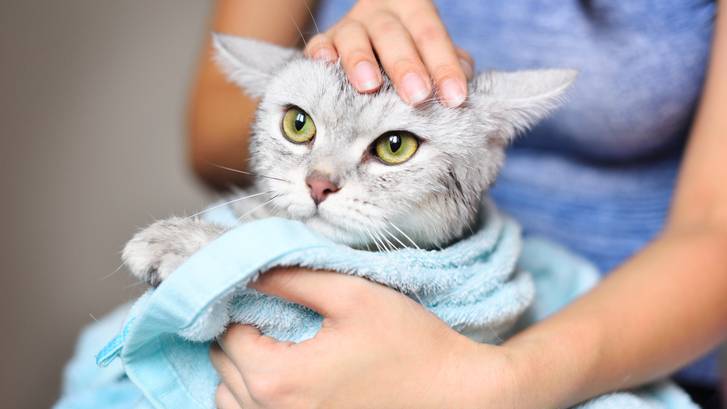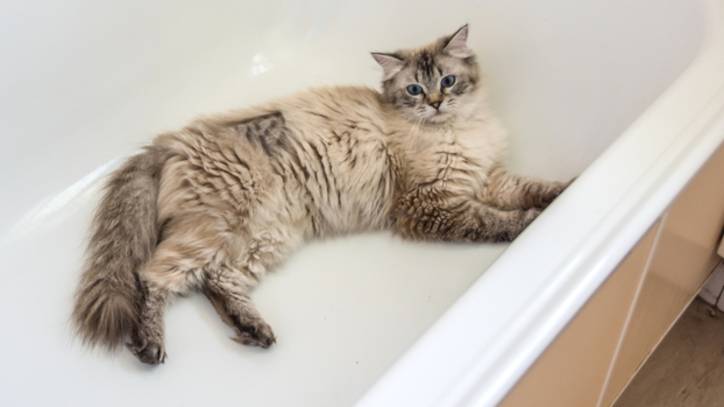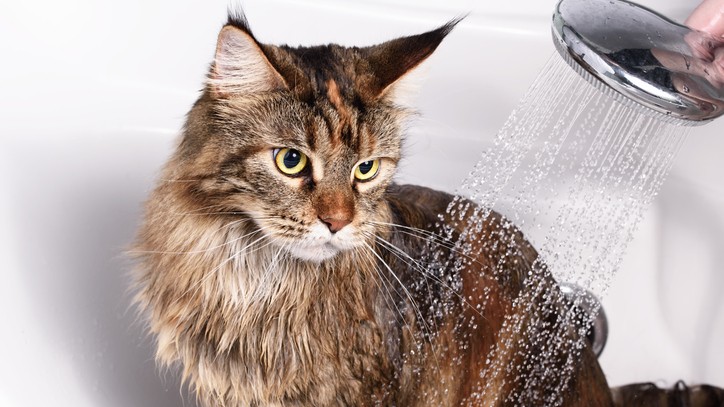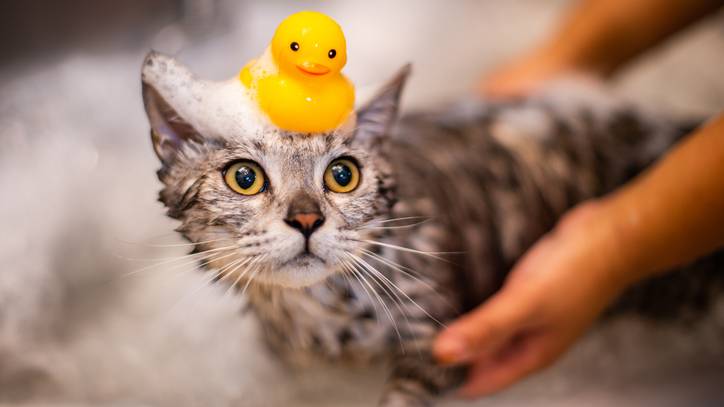Can you use dog shampoo on cats? A vet's guide to safe cat shampoo alternatives
Ever wondered if you can use dog shampoo on cats? Let’s find out!

If your cat has come home filthy and you’ve never bathed a cat before, you’re probably wondering whether you can use dog shampoo on cats, or if it’s bad for them. In fact, cat shampoo can be hard to find. It’s no secret that cats hate water, and generally we advise to avoid bathing cats as much as possible, so buying special cat shampoo might seem like a waste.
So, what happens if you use dog shampoo on cats? Is it ok to use in an emergency, or should you reach for human shampoo or something else instead?
What can you wash cats with?
Obviously, the best thing to use for bathing a cat is cat shampoo. After all, it’s been specifically created with your furry feline in mind! It’s worth investing in a good cat shampoo if you’re likely to be washing your cat often because they’re a show cat, or prone to getting into trouble.
But what do you do if your cat comes home covered in oil and needs to be bathed? As a one-off, or in an emergency, there may be some cat shampoo alternatives that you can use. We’re going to look at these in detail so you can find the best option for your cat.

What happens if you use dog shampoo on cats?
There are two main problems with using dog shampoo on cats. One is that dog shampoos may contain ingredients that are toxic to cats. Common shampoo ingredients that are toxic to cats include permethrin and essential oils. Permethrin is a topical pesticide that’s often added to flea shampoos and spot-ons for dogs. However, it’s extremely toxic to cats. And since essential oils are less toxic to dogs, they may be included in small amounts in dog shampoo for their scent or for soothing or flea-repellent properties.
However, cats are more sensitive to essential oils and can react to small amounts on their skin or when breathed in. In addition, cats are fastidious about grooming and will lick and ingest any residue left on their skin, increasing the chance of a problem.
The other main problem with using dog shampoo on cats is that the skin of a dog and a cat has a different pH. This means that shampoos designed for dogs will be the wrong pH for cat skin. Whilst this is unlikely to cause a major problem as a one-off, it can contribute to sore skin and make the problem worse, especially when used regularly.
So, not all dog shampoos will be bad for cats, but some could potentially be very dangerous – it’s worth checking the ingredients on your dog shampoo before using it on your cat.
What about human shampoo – is that ok for cats?
Human skin has a lower pH than cat skin, so shampoos formulated for human skin can be too acidic for cats. If you don’t have access to dog shampoo, human shampoo might work for cats in a pinch – but only if it’s gentle, and ideally with a higher pH than normal for a human shampoo. Baby shampoo is sometimes a good option for bathing cats and kittens, if you happen to have some in the house.
However, you should definitely check the ingredients for toxic essential oils and other ingredients and use as little as possible. Make sure you rinse it extremely well to reduce your cat’s chance of ingesting leftover shampoo.
What other cat shampoo alternatives are there?
You may have heard of the flea remedy using dish soap. This is generally not recommended by veterinarians, as Dawn dish soap and other washing up liquids can be harsh on the skin and strip important skin oils. In addition, dish soap works poorly as a flea treatment because it only affects any fleas currently on the cat – not the 95% living in the house. However, in a pinch a small amount of dish soap can be used to clean your cat, for instance if your cat is covered in oil or a toxic substance that needs removing as an emergency.

Can you wash a cat without shampoo?
If you’re just bathing your cat for a bad smell, you can wash your cat without shampoo. A sponge bath with water is often all that’s needed to clean up smells from accidents, and it’s far less stressful for your cat.
What about kittens – can you give a kitten a bath with dog shampoo?
The pH of kitten skin is similar to that of a cat, and they are sensitive to the same ingredients. However, due to their small size you should be extra careful that the shampoo doesn’t contain anything toxic. It’s also worth questioning whether a kitten really needs bathing – they’re very small, and prone to hypothermia, meaning getting them wet is generally a bad idea. If a kitten needs a bath, a wipe with a damp cloth is generally a better option than bathing them.
What to do if you use dog shampoo on cats
If you’ve just bathed your cat and realised you’ve reached for the dog shampoo instead of the cat one, don’t panic! First, rinse your cat thoroughly to make sure everything has been removed from your pet. Next, check the shampoo bottle ingredients for any toxic ingredients, especially permethrin and essential oils. If the shampoo doesn’t contain these, it’s unlikely your cat will have a problem after using a dog shampoo just once.
If you check the dog shampoo and find it contains ingredients toxic to your cat, keep your cat confined (somewhere other than the bathroom, in case there are lingering chemicals) and call the vet. Most likely, they’ll ask you to rinse once more and then talk you through the concerning symptoms to look for, depending on what the toxic ingredient is. By phoning your vet, rather than just monitoring your cat at home, you’ve made them aware of the problem so that they’ll be prepared should you need to visit as an emergency.

Final thoughts
Ideally, you should avoid bathing your cat or kitten altogether, and wipe them with a damp sponge if necessary. However, if your cat has rolled in something toxic, you may need to give them a bath as an emergency. The best option is cat shampoo, but if you can’t get hold of any, dog shampoo, baby shampoo or even dish soap are suitable alternatives. Use as little as you can get away with, and make sure you check the ingredients for permethrin and essential oils that are toxic to cats.
PetsRadar Newsletter
Get the best advice, tips and top tech for your beloved Pets
After graduating as a vet from the University of Nottingham, Dr Joanna Woodnutt went on to practice companion animal medicine in the Midlands. Since then, she has also written for countless online and print publications and is a regular contributor for Edition Dog Magazine.

